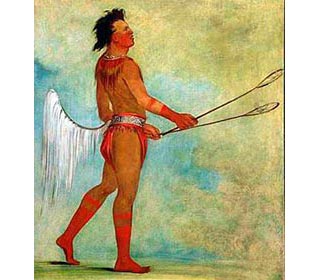Fast Facts about the History of Mississippi Indians
The climate, land, history, environment and natural resources that were available to the indigenous Indian tribes in Mississippi resulted in the adoption of the Southeast culture. - Name of State: Mississippi
- Meaning of State name: Algonquian word “misi” meaning “Great,” and “sipi,” meaning “water.”
- Geography, Environment and Characteristics of the State of Mississippi: Low, fertile delta, bluffs, sandy gulf, coastal terraces, pine woods and prairie
- Culture adopted by Mississippi Indians: Southeast Cultural Group
- Languages: Muskogean
- Way of Life (Lifestyle): Hunter gatherers and hunter farmers
- Types of housing, homes or shelters: Asi Wattle and Daub houses
History Timeline of the Mississippi Indians - 10,000 B.C.: Paleo-Indian Era (Stone Age culture) the earliest human inhabitants of America who lived in caves and were Nomadic hunters of large game including the Great Mammoth and giant bison
- 7000 BC: Archaic Period in which people built basic shelters and made stone weapons and stone tools
- 1000 AD: Woodland Period including the Hopewell cultures established along rivers in the Northeastern and Midwestern United States which included trade exchange systems and burial systems
- 1000: Mississippian Culture established. This was the last of the mound-building cultures of North America in Midwestern, Eastern, and Southeastern United States
- 1540: Hernando de Soto (1500-1542) explores Mississippi
- 1643: René-Robert Cavelier, Sieur de La Salle (1643-1687) navigates the Mississippi River and claims Mississippi for France
- 1700's: 1700s French fur trading era begins
- 1729: Following the Natchez Wars of 1716, 1722 and 1723 the Natchez Rebellion (1729–1731) when Natchez Indians massacre 250 people at Fort Rosalie.
- 1763: Treaty of Paris
- 1775: 1775 - 1783 - The American Revolution.
- 1776: July 4, 1776 - United States Declaration of Independence
- 1803: The United States bought the Louisiana Territory from France for 15 million dollars for the land
- 1805: The Treaty of Mount Dexter - the Choctaws sell 4.5 million acres of land to the U.S. government and this opens up land to white settlement
- 1812: 1812 - 1815: The War of 1812 between U.S. and Great Britain, ended in a stalemate but confirmed America's Independence
- 1813: Creek War (1813–1814) erupted in Alabama and Georgia. The Creek Indians were defeated by American forces led by Andrew Jackson at Talladega in 1813, at Emuckfau, in 1814, at Enotochopco in 1814 and finally at the Horseshoe Bend of the Tallapoosa River when 750 Creeks were killed or drowned, and 201 whites were killed or wounded.
- 1817: Mississippi was admitted to the Union
- 1830: Indian Removal Act
- 1832: Department of Indian Affairs established
- 1861: 1861 - 1865: The American Civil War
- 1862: U.S. Congress passes Homestead Act opening the Great Plains to settlers
- 1865: The surrender of Robert E. Lee on April 9 1865 signalled the end of the Confederacy
- 1887: Dawes General Allotment Act passed by Congress leads to the break up of the large Indian Reservations and the sale of Indian lands to white settlers
- 1969: All Indians declared citizens of U.S.
- 1979: American Indian Religious Freedom Act was passed
History of Mississippi Indians - Destruction and Decline
The history of the European invasion brought epidemic diseases such as tuberculosis, cholera, influenza, measles and smallpox. The Native Indians of Mississippi had not developed immunities against these diseases resulting in huge losses in population. Exploitation including the leverage of taxes, enforced labor and enslavement were part of their history, taking their toll on the Mississippi Indians. |
